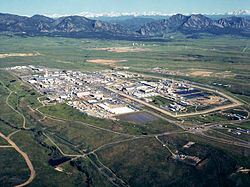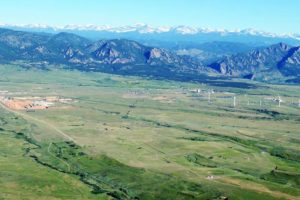Rocky Flats
What is now is the Rocky Flats National Wildlife Refuge once was the Rocky Flats Plant where triggers for nuclear weapons were manufactured. The main raw ingredient for the triggers was plutonium, one of the most toxic and radioactive substances known, with a half-life of over 4000 years. During the forty years the plant operated, there were two major fires in glove boxes where plutonium discs were handled. In this and other incidents, many pounds of plutonium were released. The Wikipedia article has an excellent summary and bibliography.
I was talking to a woman recently about Rocky Flats. Her father worked there for several years when the plant was in full operation. He had to deal with a glove box where the plutonium had started to burn. The gloves were so hot he had to wear other gloves before he could put his hands into the glove box gloves to stop the reaction. He probably saved some lives. He died of cancer.
I became more interested in Rocky Flats after reading Full Body Burden, by Kristin Iverson, an English Professor who grew up in the area. The book is controversial, disagreeing with the environmental assessments by the Colorado Department of Public Health and Environment and the Nuclear Regulatory Commission. Given all I have read, I am skeptical of the official lint that the area is safe, and exposure to the public was and is minimal. Decide for yourself.
Iverson writes that a large area of contaminated topsoil was covered with more topsoil and pronounced safe. Rocky Flats is aptly named, as millions of tons of glacial erosion products have covered the area with gravel. The surface is called ground armor, mostly rock, as the high winds in the area have blown much of the finer material away. That continues, and rodents burrowing bring buried soil to the surface where it blows into the Denver Metro area..
The nearby Standley Lake, a large irrigation reservoir that provides water to Westminster and Broomfield, allows boating and water skiing but bans swimming because the lake bottom is contaminated with plutonium. Many experts have advocated banning development in the area, but houses are going up.
I got interested again recently because the NOAA National Weather Radar website is my go-to means of weather monitoring. The TV weather people are either warning the apocalypse is imminent or it is fine, no rain, just before a major hailstorm. Over a period of months I noticed a nearly constant radar image indicating precipitation over the NWR. Day or night, weekends or weekdays, the image is there. If it really is rain, the refuge would be a major swamp at the base of the Rocky Mountains.
Many years ago I was a radar repairman in the Army. One of the radars we maintained put out so much radio frequency energy it would kill birds flying in front. We had quite a bit of training about ionizing radiation. Radars emit radiation, so does decaying plutonium. I could not come up with any explanation for the radar image other than radioactive decay. This would be disastrous, as much of the Denver metro area is downwind of Rocky Flats.
I sent a number of emails to the NWS, TV stations, and the CDPHE. I guess I stirred things up a bit, because I got a long, thoughtful letter from CDPHE outlining the investigation I generated. The conclusion reached is that the radar image is from dust coming from a gravel mining and crushing operation just adjacent to the refuge. Here is the letter:
Begin forwarded message:
From: “Spreng, Carl” <carl.spreng@state.co.us>
Date: July 13, 2016 at 3:56:58 PM MDT
To: levanks@me.com
Cc: Phillip Peterson – CDPHE <phillip.peterson@state.co.us>, Surovchak Scott <Scott.Surovchak@lm.doe.gov>, “Moritz, Vera” <Moritz.Vera@epa.gov>, Lindsay Masters – CDPHE <lindsay.masters@state.co.us>, Darr Bob <Bob.Darr@lm.doe.gov>, Rob Beierle – CDPHE <robert.beierle@state.co.us>, Smith Warren <warren.smith@state.co.us>
Subject: Rocky Flats
William Shanks
Mr. Shanks,
Your message sent to Phill Peterson in our Radiation Control Program was forwarded to me for response. I discussed your observations with a representative of NOAA. NOAA scientists apparently notice a fairly consistent dust cloud in the Rocky Flats area. This is consistent with the adjacent gravel operations — current and historic. You can observe the dust that rises off these operations as you drive by the site.During remediation, the source areas of radiological risk in the Central Operable Unit (managed by the US Dept. of Energy) were excavated and shipped out of state. The human health risks inside the Central Operable Unit and the remainder of the site (managed as a refuge by the US Fish and Wildlife Service) were assessed following remediation and risks were found to be very low. A final decision for the site declared that any conceivable use would be appropriate in the Refuge area. That decision was based on an enormous amount of data (surface soil, subsurface soil, groundwater, surface water, air). After the remediation was completed, an aerial survey was conducted using a low-flying helicopter with detectors.Offsite areas in the vicinity of Rocky Flats are also safe for any use. Numerous offsite surveys confirm the conclusion that only a few samples just east of Rocky Flats detected plutonium concentrations above background levels. You can read more information about the sampling on and around Rocky Flats on the Colorado Dept. of Public Health and Environment’s (CDPHE) web page at: http://www.cdphe.state.co.us/hm/rf/index.htm.Please contact us again if you have more questions.
Carl SprengP 303.692.3358 | F 303.759.5355 | C 303-328-72894300 Cherry Creek Drive S, Denver, CO 80246-1530
———- Forwarded message ———-
From: Carol Leavenworth <levanks@me.com>
Date: Tue, Jul 5, 2016 at 12:39 PM
Subject: Rocky Flats
To: phillip.peterson@state.co.us
Sir,
I notice there is a consistent radar image over the Rocky Flats NWR when viewing the NOAA national weather radar website. I am no physicist, but ionizing radiation is detectable by radar. Is this the case at Rocky Flats? Is there a radiation hazard outside the closed zone? Is there a public health risk for the nearby residential areas?I was a radar repairman in the Army in the 1960’s and remain interested in the field. There weren’t many RF energy safeguards back then and there were nuclear weapons stored where I was stationed in Germany.
Thanks.
William Shanks
2032 S. Logan St.
Denver CO 80210
303-830-0599
I was skeptical, so I drove out there. I made a couple of circuits around the area, passing through new subdivisions where grading was going on and decided that was not the source. I then turned off SH 93, the road from Golden to Boulder into what used to be the west gate to the bomb plant. I went past lots of no trespassing signs to a big gravel mining and crushing operation. The crusher was producing a significant dust cloud. There were lots of big gravel trucks, indicating a major operation.
I left without getting stopped for trespassing and made another lap around the refuge. The gravel operation is to the southwest of the refuge, and I could see the dust cloud from north of the refuge. Mystery solved. it is not ionizing radiation creating the radar image, it is dust.
There is no radioactive cloud coming off Rocky Flats. There is, however, still a lot of radioactive and chemical pollution out there. I suggest you not buy one of the nice new houses being built in the area..


